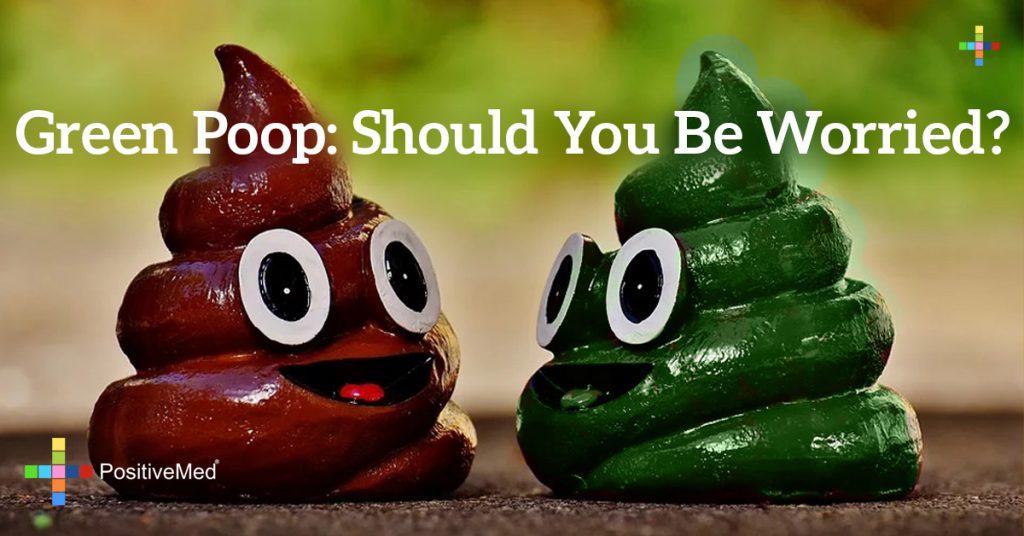
Green Poop: Should You Be Worried?
Our bodies exhibit a number of colors and various shades in the skin, eyes, mouth and internally. Most of these natural colors are in the families of brown and tan and black and red. Green is one color, other than in the eyes, that most of us associate with something sinister when it comes from the body. Nasty things, like infections and pus and gangrene. But what about green poop?

We’re not talking about the rowdy Irish soccer fan who deliberately downs a heavy dose of green vegetable dye in order to celebrate St. Patrick’s Day with green poop. This discussion concerns the rare occasion when one expels green-colored poop, feces or excrement naturally. If you find greenish-colored poop in your toilet bowl after use, there’s no need to hit the panic button. Only rarely does the green color indicate a possible intestinal problem.
Bowel movements are generally brown in color because of bile produced in the liver. The food you eat typically takes three days from the time you eat it until you expel it into the toilet. If it takes a shorter time, the result may be a green stool.
Two main factors contribute to the color of our poop: what we eat and the yellowish-green bile that helps us digest the fat in our food.
Bile acts as an emulsifier. It absorbs fat soluble vitamins in the digestion process. It also aids to soften the stools and gives poop that familiar brownish color. In addition, bile helps to alkalinize the food in our intestines. Enzymes in the digestive tract change the yellowish-green bile pigments from green to brown.
RELATED ARTICLE: “Oopsy” Connection Between Your Coffee And Your Poop
Food Digestion
If food travels through the large intestine too rapidly, the bile doesn’t have a change to completely break down and it retains its greenish color in the poop. Diarrhea is one irritation that forces the food though and out the digestive tract before it’s had time to be processed, so any condition that causes diarrhea can cause green poop temporarily.
Foods That can Cause Green Poop
• Green vegetables like spinach and kale.
• Blueberries eaten in excess.
• Excess juicing of green vegetables or fruits, especially if taken during a juice fast
• Popsicles, dessert icing, and drinks that are laced with blue vegetable dyes.
• Grape-flavored Pedialyte (oral electrolyte solution) can turn poop into a bright green)
• Foods with chlorophyll (green pigment) such as algae, wheatgrass,, spirulina, barley grass and seaweed.
• Nutritional green-powder supplements that contain chlorophyll.
• Iron supplements and iron-enriched products.
So you see, the color of your poop is usually a reflection of what you eat more than some internal problem to be concerned with. If you eat an usually large number of green leafy vegetables over a short span of time on some new diet fad, for instance, don’t be surprised to experience a short period of producing green poop.
When to be Concerned
Sometimes green poop can be an indication of health problems.
Cancer– According to the National Cancer Institute, cancer patients who undergo a bone-morrow transplant can develop a graft-versus-host disease. The symptoms include watery, green diarrhea.
Infections– Infections caused by bacterium salmonella or giardia can cause can cause green stool as well as abdominal cramps and fevers.
If your green stools continue for a prolonged period of time, you should consult a doctor and have your stool analyzed. It’s also possible to go directly to a testing lab and have them do a stool sample workup if you want to bypass the expense of a doctor. Tests are any relatively cheap and simple. Then, if a problem is discovered, you should consult a doctor.
Red-Flag Poop
If your poop turns black in color, it could mean you have some internal bleeding of some kind. It could be an ulcer or something more serious like cancer. If bleeding is the cause, the poop will also be tarry and have an unpleasant odor.
On the other hand, the black color could be the result of taking vitamins that contain iron or bismuth salicylate. Don’t you make that diagnosis yourself, however. Let a doctor do that.







